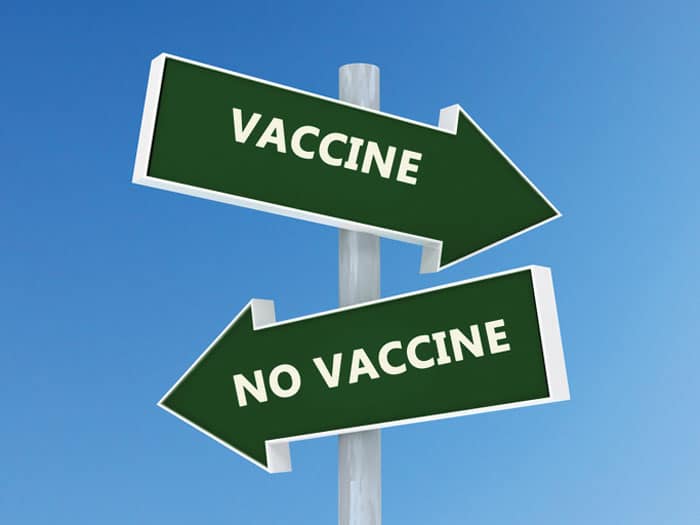
When you perceive an issue as life or death, it’s hard to be civil and reasonable.
That’s my best explanation for the sheer absence of civility between those who passionately believe in taking the COVID vaccine and those who passionately don’t.
Let’s put aside the political polarization and conspiracy theories and focus only on the most reasonable arguments on both sides.
Both anti-vaxxers and the “vaccine hesitant” cite the absence of testing for any long-term side effects of COVID vaccines, along with the inherent risks associated with the mRNA technology. I’ve spoken to pro-vaccine medical experts who acknowledge there is some merit in that position.
The Pharmaceutical Technology website, while firmly endorsing the vaccine, adds: “There are potential risks from mRNA vaccines that include local and systemic inflammatory responses, which could lead to autoimmune conditions, and the toxic effects of any synthetic nucleosides or vaccine delivery components.”
The pro-vaccine crowd, meanwhile, cites the much higher risks associated with not taking the vaccine. Among other arguments, they cite a recent CDC study that found that 92 percent of positive cases, 92 percent of hospitalizations, and 91 percent of COVID-19-related deaths were reported among those not fully vaccinated.
So, one side is afraid it may kill or harm them if they take it, while the other side is afraid it may kill or harm them if they don’t.
Normally, we would just stop there and go have coffee. Everyone has freedom of choice; you do what you want with your body, I’ll do what I want with mine.
If only it were that simple!
The reason so many people are at each other’s throats is that we’re dealing with a highly contagious virus, which means that whoever carries the virus can be a threat to anyone they encounter. One’s freedom of choice clashes with one’s right to stay alive.
If someone is fully vaccinated, there may be a much lower chance they’ll get infected and be hospitalized, but for many people, even that lower chance is not worth taking.
What further complicates things is that we’re dealing with probabilities, not certitudes. If someone is fully vaccinated, there may be a much lower chance they’ll get infected and be hospitalized, but for many people, even that lower chance is not worth taking.
If someone is not vaccinated, there may be a much higher chance they’ll get infected and be hospitalized, but for many people, it’s better than risking what they believe is possible long-term health damage.
What further complicates matters is that there is a collective interest in achieving herd immunity, which happens when so many people are immune to the virus that the outbreak sputters out. Even if you’re an anti-vaxxer, it’s in your interest to see that happen.
In wise guy mode, I once asked an anti-vaxxer friend: “Let me get this straight. You refuse to risk your life by taking the vaccine, but you want me to risk mine so we can all lick this thing?” (We’re still friends.)
Is there a reasonable way forward so that both sides don’t have to kill each other? With the stakes so high, I’m not sure.
I do know that vaccine mandates are blunt weapons that only magnify emotions. The thing with regulations is that they mean nothing unless they are enforced. But enforcement is precisely when acrimony peaks—when people feel coerced into doing something in order to keep their job or walk into a theater or send their kid to school.
The thing with regulations is that they mean nothing unless they are enforced. But enforcement is precisely when acrimony peaks—when people feel coerced into doing something in order to keep their job or walk into a theater or send their kid to school.
We’re learning now that mandates may even be on shaky legal ground. On Nov. 6, a federal appeals court in Louisiana put a temporary hold on President Joe Biden’s mandate that companies with more than 100 employees must ensure they are vaccinated by early January, citing possible “grave statutory and constitutional” issues.
Personally, I’m in a bind. I’m a diehard believer in freedom of choice, but I’m also pro-vaccine. I recognize the possible long-term risks, but I’ve chosen those risks over the risk of getting COVID. As a rule, however, I’m not fond of the government telling me what I can or cannot do with my body.
Did the government have an alternative to the heavy-handed mandates?
Yup. They could have called me.
For many years, I ran an advertising agency and saw firsthand the power of persuasion.
“This is drugs,” an announcer famously intoned over a shot of a frying pan. As two eggs start frying on the pan, he adds, “This is your brain on drugs. Any questions?”
Decades later, people still remember that anti-drug campaign. The advertising community has been doing this for years—using the magic of creativity to take on social issues like smoking and protecting our environment.
If our government is so eager to get more people vaccinated, they ought to take a fraction of that trillion-dollar infrastructure budget and quadruple the spending on their current media campaign. They might also ask their creative team to punch up the present campaign—“It’s Up To You”— which is reasonable but hardly memorable.
The point is this: Persuasion is more powerful and less acrimonious than coercion.
There may be just enough vaccine hesitant people out there who will be swayed by a compelling message, which would get us all over the hump and into the promised land of herd immunity.
In the meantime, vaxxers and anti-vaxxers are better off talking about Ted Lasso or climate change.






















 More news and opinions than at a Shabbat dinner, right in your inbox.
More news and opinions than at a Shabbat dinner, right in your inbox.